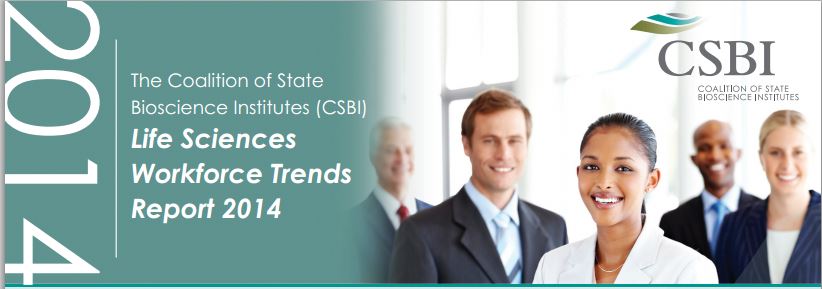The Coalition of State Bioscience Institutes (CSBI) Releases the 2014 Life Sciences Workforce Trends Report at BIO. Key Findings Support Industry Hiring Demand with a Strong Need for Knowledge‐Based Employees.
San Diego, California (June 25, 2014) –
The Coalition of State Bioscience Institutes (CSBI) released the 2014 Life Sciences Workforce Trends Report today at the BIO International Convention held this week in San Diego, California. The report provides a national snapshot of the current and projected talent needs in the life sciences industry.
Qualitative and quantitative data support the fact that the life sciences industry continues to experience demand at all levels, with a strong need for knowledge‐based employees. Job postings in the life sciences industry remained at historic highs with over 73,000 positions posted last year, a 15% increase over 2010.
“We are very excited about the release of this report, as it will serve as an important resource for leaders in industry, academia and government,” said Lori Lindburg, CSBI Chair and Executive Director, BayBio Institute. “The quantitative data are strong and further strengthened by the findings highlighted in candid interviews with over 100 industry executives reflecting never‐before captured insight into the current hiring practices and future workforce needs. These data will be useful to both industry and academia as we partner to produce the next generation of the life sciences workforce, and to legislators who can steer training dollars and incentivize such partnerships.”
“One of the most compelling aspects of this report is the clearly defined need for academia and industry to join forces to ensure the future scientific workforce has the requisite talent, skills, and training to meet tomorrow’s challenges,” said Jean Lim Terra, president of the Amgen Foundation. “The Amgen
Foundation is proud to have supported this report and recognizes that addressing the future STEM workforce requires partnerships to create greater capacity for innovation.”
Several themes emerged among life sciences industry leaders and hiring managers who participated in the interviews including the need for:
- Individuals with strong science skills combined with multidisciplinary academic training and experience
- Regulatory professionals who can help bridge the gap between regulatory functions and business activities
- Scientists, engineers and clinicians who possess cross‐functional skills that promote strong communication and the ability to interface well with both internal and external partners
- People with policy acumen who can help navigate health economics and the Affordable Care Act as well as influence legislators
- Strong and informed partnerships between academia and industry to provide tailored and relevant training to effectively meet industry needs.
“This report provides an important platform for a national conversation on establishing best practices for preparing talent to meet the evolving skill needs of our industry,” states Kathy Nugent, CSBI Workforce Development Committee Co‐Chair and author of the report.
Methodology
CSBI conducted a series of interviews with executives and strategic leaders in more than 100 life sciences companies within the U.S. The interviews addressed current and future business priorities/capabilities and their implications for workforce and training needs. The qualitative interviews and analysis were conducted in parallel with a quantitative analysis using Burning Glass, a proprietary platform that aggregates, extracts, codes and normalizes nationwide job posting data from more than 23,000 job boards, newspapers, employers and other websites.
Read the Report
About CSBI
Founded in June 2012, the Coalition of State Bioscience Institutes (CSBI) is a national coalition of 42 state bioscience organizations and the Biotechnology Institute that are working to ensure America’s leadership in bioscience innovation by delivering industry‐led life sciences education, workforce development, and entrepreneurship programs through a nationally coordinated effort

